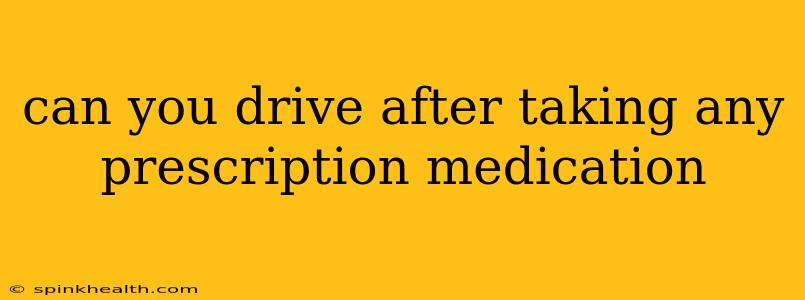Can You Drive After Taking Any Prescription Medication? The Crucial Question of Driving Safety
The short answer is: absolutely not. It's not a simple yes or no. Driving after taking any prescription medication is a risky gamble with potentially devastating consequences. Whether or not a specific medication impairs your driving ability depends on a multitude of factors, making it a deeply personal and crucial decision. This isn't something to take lightly. Let's delve deeper.
Imagine this: You're feeling under the weather, a prescription in hand for a much-needed remedy. You pop the pill, feeling a sense of relief. But then, the question arises – can you still safely get behind the wheel? The answer, as you’ll see, isn't always clear-cut.
What Medications Affect Driving Ability?
Many medications can affect your ability to drive safely. These include, but are not limited to:
- Pain Relievers: Opioids, even at prescribed doses, can cause drowsiness, slowed reaction time, and impaired judgment.
- Sedatives and Hypnotics: These drugs are specifically designed to induce sleep or relaxation, significantly impacting your alertness and coordination behind the wheel.
- Anti-anxiety Medications: While they can alleviate anxiety, they can also cause drowsiness, dizziness, and blurred vision.
- Antidepressants: Some antidepressants can cause drowsiness or other side effects that affect driving skills.
- Muscle Relaxants: These medications can lead to drowsiness and weakness, making driving unsafe.
- Antihistamines: Certain antihistamines, particularly those for allergies, can cause drowsiness and dizziness.
This isn't an exhaustive list, and even seemingly innocuous medications can have unexpected side effects. The key is to always check the medication's label and consult your doctor or pharmacist.
How Do Medications Impair Driving?
Medications impair driving in various ways:
- Drowsiness and Fatigue: This is perhaps the most common side effect leading to accidents. Even mild drowsiness can significantly slow reaction times.
- Blurred Vision: Some medications can temporarily blur vision, making it difficult to judge distances and react to changing traffic conditions.
- Impaired Coordination: Difficulty with coordination can make it harder to control the vehicle.
- Slowed Reaction Time: This makes it harder to react appropriately to unexpected events on the road.
- Impaired Judgment: Some medications can cloud judgment, leading to risky decisions.
What Should I Do Before Driving After Taking Medication?
- Read the Label Carefully: Pay close attention to the section on potential side effects. "Drowsiness" or "may cause dizziness" are major red flags.
- Talk to Your Doctor or Pharmacist: This is crucial. They can advise you on whether driving is safe after taking a specific medication.
- Don't Self-Medicate: Never mix medications without consulting a doctor.
- Don't Drive if You Feel Drowsy, Dizzy, or Impaired: Your safety and the safety of others is paramount.
- Plan Ahead: If you know a medication will affect your driving, arrange for alternative transportation.
How Long Should I Wait Before Driving After Taking Medication?
There's no single answer. It varies greatly depending on the medication, dosage, and your individual response. Always follow your doctor's advice. Even if the label doesn't explicitly mention driving, err on the side of caution. Wait until you feel completely alert and unimpaired before driving.
What Happens if I'm Caught Driving Under the Influence of Medication?
Driving under the influence of medication, even prescription medication, can result in serious legal consequences, including fines, license suspension, or even jail time. The penalties can be severe.
In Conclusion: Your safety and the safety of others should always come first. When it comes to driving and medication, it's never worth the risk. Always consult your doctor or pharmacist, and never drive if you're unsure. Remember, responsible medication use includes responsible driving habits.

